九年级英语 Unit 2 I used to be afraid of the dark单元综合测试题1 人教新目标版
初中九年级英语Unit2 I used to be afraid of the dark

Unit2 I used to be afraid of the dark [语言目标]language goal:Talk about what you used to be like.谈论你过去的外表。
[学习目标]Functions:1. 学会陈述自己过去常做的事情2. 学会陈述自己过去的爱好等3. 能够表达自己现在和过去在外表、性格、娱乐等方面的变化4. 能够表达朋友、家人等现在和过去的变化[语言结构]Target Language:1. I used to be short when I was young.我年轻时个子很矮。
2. —Did you use to have straight hair?你过去是直发吗?—Yes, I did. 是的。
3. —Did you use to play the piano?你过去弹钢琴吗?—No, I didn’t. 不,我不弹。
4. I used to be afraid of dark.我过去害怕黑暗。
5. I’m terrified of the snakes.我害怕蛇。
6. —Did you use to be afraid of being alone?你过去害怕独自一人呆着吗?—Yes, I did. 是的,我怕。
7. I used to walk to school.我过去走着上学。
[主要词汇]Vocabulary:dark 黑暗sure 无疑,确实terrify 使害怕,使恐惧on 接通的,工作着的spider 蜘蛛insect 昆虫chew 嚼,咀嚼gum 口香糖right 立即,马上comic 连环漫画hardly 不十分,简直没有used to do sth. 过去经常be interested in 对…感兴趣be on the swim team 是游泳队成员be afraid of 害怕be terrified of 害怕with thelight on 灯开着做…worry about 担心chew gum 嚼口香糖these days 目前,如今 not…anymore 不再[词汇复习]recycling:short hair 短发curly hair 卷发long hair 长发straight hair 直发tall 高的short 矮的(be)medium height 中等身高 thin 瘦的heavy 重的,沉的 (have/has) a medium build 中等胖瘦[语法分析]一、本单元语法重点内容是used to这个句型。
Unit 2 I used to be afraid of the dark(单词巧记 句型语法剖析)
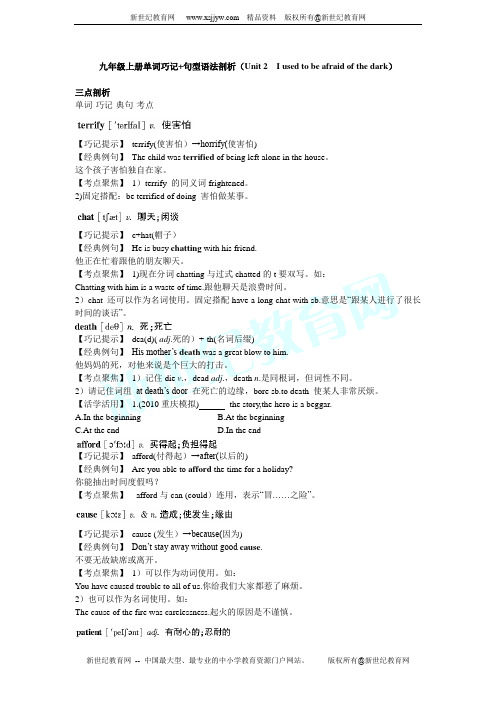
九年级上册单词巧记+句型语法剖析(Unit 2I used to be afraid of the dark)三点剖析单词·巧记·典句·考点【巧记提示】terrify(使害怕)→horrify(使害怕【经典例句】The child was terrified of being left alone in the house。
这个孩子害怕独自在家。
【考点聚焦】1)terrify 的同义词frightened。
2)固定搭配:be terrified of doing 害怕做某事。
【巧记提示】c+hat(帽子)【经典例句】He is busy chatting他正在忙着跟他的朋友聊天。
【考点聚焦】1)现在分词chatting与过式chatted的t要双写。
如:Chatting with him is a waste of time.跟他聊天是浪费时间。
2)chat 还可以作为名词使用。
固定搭配have a long chat with sb.意思是“跟某人进行了很长时间的谈话”。
【巧记提示】dea(d)( adj.死的)+-th(名词后缀【经典例句】His mother’s death他妈妈的死,对他来说是个巨大的打击。
【考点聚焦】1)记住die v.,dead adj.,death n.是同根词,但词性不同。
2)请记住词组at death’s door 在死亡的边缘,bore sb.to death 使某人非常厌烦。
【活学活用】1.(2010重庆模拟)A.In the beginningB.At the beginningC.At the endD.In the end【巧记提示】afford(付得起)→after(以后的【经典例句】Are you able to afford你能抽出时间度假吗?【考点聚焦】afford与can (could)连用,表示“冒……之险”。
九年级英语:Unit 2 I used to be afraid of the dark.Unit 2 I used to be afraid of the dark.

初中英语新课程标准教材英语教案( 2019 — 2020学年度第二学期 )学校:年级:任课教师:英语教案 / 初中英语 / 九年级英语教案编订:XX文讯教育机构Unit 2 I used to be afraid of the dark.Unit 2 I used to be afraid of the dark.教材简介:本教材主要用途为通过学习英语的内容,提高学生的语言技能,增加一项语言能力,有利于国际化的日常交流、生活、工作等,本教学设计资料适用于初中九年级英语科目, 学习后学生能得到全面的发展和提高。
本内容是按照教材的内容进行的编写,可以放心修改调整或直接进行教学使用。
unit 2 i used to be afraid of the dark.self checkperiod four基础达标ⅰ. 根据句意及首字母(汉语)提示,补全单词1. mario is a_____ of sea. she doesn’t know how to swim.2. sorry, i can’t _____(加入) you. i have much work to do.3. don’t w____ about things so much. everything will be ok.4. i really m____ my friend tina. i haven’t seen him for a long time.5. i used to have short hair but now i ____(生长) it long.ⅱ.根据所给的汉语提示完成句子1. 大声的音乐使我紧张。
loud music _____ me ____.2. 我必须为考试而作准备。
i ____ study ____.3. 他的朋友搬到了另一个城市。
¬ his friend ____ another city.4. 玉梅好像变化很大。
九年级英语-Unit_2_I_used_to_be_afraid_of_the_darkAlMHln
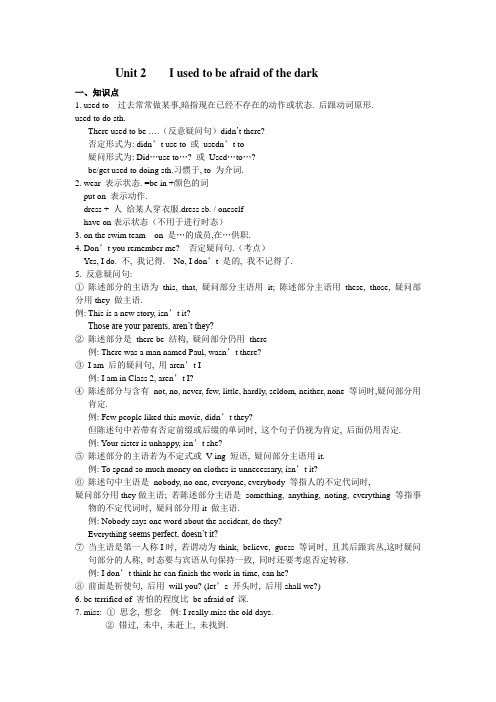
Unit 2 I used to be afraid of the dark一、知识点1. used to 过去常常做某事,暗指现在已经不存在的动作或状态. 后跟动词原形.used to do sth.There used to be ….(反意疑问句)didn’t there?否定形式为: didn’t use to 或usedn’t to疑问形式为: Did…use to…? 或Used…to…?be/get used to doing sth.习惯于, to 为介词.2. wear 表示状态. =be in +颜色的词put on 表示动作.dress + 人给某人穿衣服.dress sb. / oneselfhave on表示状态(不用于进行时态)3. on the swim team on 是…的成员,在…供职.4. Don’t you remember me? 否定疑问句.(考点)Yes, I do. 不, 我记得. No, I don’t 是的, 我不记得了.5. 反意疑问句:①陈述部分的主语为this, that, 疑问部分主语用it; 陈述部分主语用these, those, 疑问部分用they 做主语.例: This is a new story, isn’t it?Those are your parents, aren’t they?②陈述部分是there be 结构, 疑问部分仍用there例: There was a man named Paul, wasn’t there?③I am 后的疑问句, 用aren’t I例: I am in Class 2, aren’t I?④陈述部分与含有not, no, never, few, little, hardly, seldom, neither, none 等词时,疑问部分用肯定.例: Few people liked this movie, didn’t they?但陈述句中若带有否定前缀或后缀的单词时, 这个句子仍视为肯定, 后面仍用否定.例: Your sister is unhappy, isn’t she?⑤陈述部分的主语若为不定式或V-ing 短语, 疑问部分主语用it.例: To spend so much money on clothes is unnecessary, isn’t it?⑥陈述句中主语是nobody, no one, everyone, everybody 等指人的不定代词时,疑问部分用they做主语; 若陈述部分主语是something, anything, noting, everything 等指事物的不定代词时, 疑问部分用it 做主语.例: Nobody says one word about the accident, do they?Everythi ng seems perfect, doesn’t it?⑦当主语是第一人称I时, 若谓动为think, believe, guess 等词时, 且其后跟宾丛,这时疑问句部分的人称, 时态要与宾语从句保持一致, 同时还要考虑否定转移.例: I don’t think he can finish the work in time, can he?⑧前面是祈使句, 后用will you? (let’s 开头时, 后用shall we?)6. be terrified of 害怕的程度比be afraid of 深.7. miss: ①思念, 想念例: I really miss the old days.②错过, 未中, 未赶上, 未找到.例: It’s a pity that you miss the bus.The boy shot at the goal, but missed.8. no more (用在句中)=not…any more (用在句尾) 指次数;no longer (用在句中)=not…any longer (用在句尾) 指时间.9. right: ①adj. 正确的, 右边的②n. 右方, 权利③adv. 直接地.10. It seems that Yu Mei has changed a lot. = Yu Mei seems to have changed a lot.11. afford + n. /pron. afford + to do 常与can, be able to 连用.例: Can you afford a new car?The film couldn’t afford to p ay such large salaries.12. as well as 连词, 不但…而且…强调前者. (若引导主语, 谓动与前者在人称和数上一致例: Living things need air and light as well as water.生命不仅需要水, 还需要空气和阳光.I as well as they am ready to help you.不仅是他们, 我也愿意帮助你.13. alone = by oneself 独自一人. lonely 孤独的, 寂寞的.14. in the last/past + 一段时间during the last/past + 一段时间与现在完成时连用.15. die (v.) dead (adj.) death (n.) dying (垂死的)16. play the piano弹钢琴17. ①be/ become interested in sth. 对…感兴趣②be interested in doing sth. 对做…感兴趣③show great interest in 在……方面产生极大的兴趣④a place of interest 一处名胜some places of interest如:He is interested in math, but he isn’t interested in speakingEnglish. 他对数学感兴趣,但是他对说英语不感兴趣。
【范文】人教版新目标九年级英语Unit 2 I used to be afraid of the d
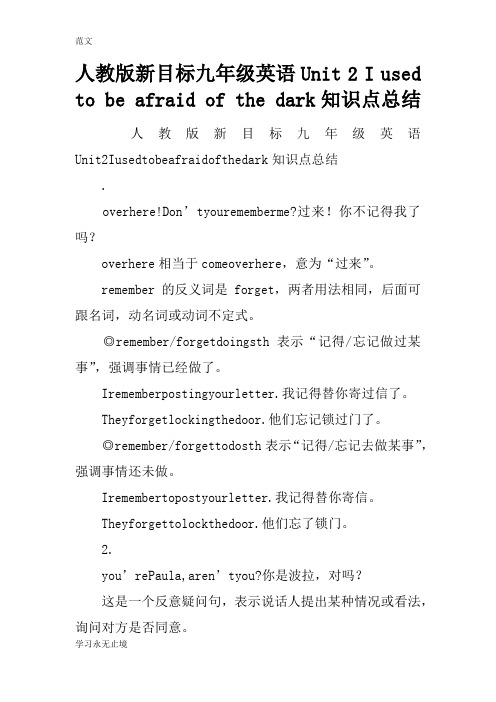
人教版新目标九年级英语Unit 2 I used to be afraid of the dark知识点总结人教版新目标九年级英语Unit2Iusedtobeafraidofthedark知识点总结.overhere!Don’tyourememberme?过来!你不记得我了吗?overhere相当于comeoverhere,意为“过来”。
remember的反义词是forget,两者用法相同,后面可跟名词,动名词或动词不定式。
◎remember/forgetdoingsth表示“记得/忘记做过某事”,强调事情已经做了。
Irememberpostingyourletter.我记得替你寄过信了。
Theyforgetlockingthedoor.他们忘记锁过门了。
◎remember/forgettodosth表示“记得/忘记去做某事”,强调事情还未做。
Iremembertopostyourletter.我记得替你寄信。
Theyforgettolockthedoor.他们忘了锁门。
2.you’rePaula,aren’tyou?你是波拉,对吗?这是一个反意疑问句,表示说话人提出某种情况或看法,询问对方是否同意。
知识拓展反意疑问句主要有以下几种类型:主句为肯定陈述句时,附加疑问句为:系动词/情态动词/助动词的否定(缩写)形式+主语。
Thegirlwenttoschoollateyesterday,didn’tshe?昨天那个女孩上学迟到了,是吗?主句为否定陈述句(包括肯定形式中有never,seldom,hardly,few,little,nobody等否定意义的词)时,附加疑问句为:系动词/情态动词/助动词的肯定形式+主语。
youhaveneverbeentoBeijing,haveyou?你没有去过北京,是吗?主句为祈使句时,附加疑问句为:will或shall+主语。
openthewindow,willyou?打开窗户,好吗?Let’sgotoschool,shallwe?我们上学去吧,好吗?3.wow!Peoplesurechange.哇!人确实是会变的。
九年级英语全册 Unit 2 I used to be afraid of the dark
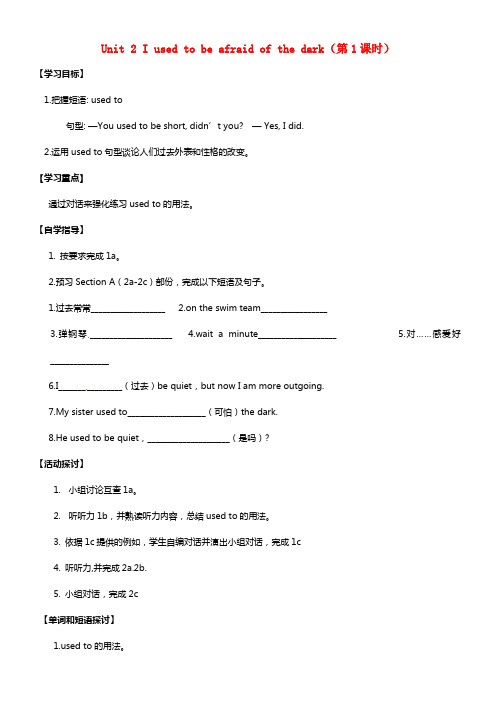
Unit 2 I used to be afraid of the dark(第1课时)【学习目标】1.把握短语: used to句型: —You used to be short, didn’t you? — Yes, I did.2.运用used to句型谈论人们过去外表和性格的改变。
【学习重点】通过对话来强化练习used to的用法。
【自学指导】1. 按要求完成1a。
2.预习Section A(2a-2c)部份,完成以下短语及句子。
1.过去常常___________________2.on the swim team_________________3.弹钢琴_____________________4.wait a minute____________________5.对……感爱好_______________6.I________________(过去)be quiet,but now I am more outgoing.7.My sister used to____________________(可怕)the dark.8.He used to be quiet,_____________________(是吗)?【活动探讨】1.小组讨论互查1a。
2.听听力1b,并熟读听力内容,总结used to的用法。
3. 依据1c提供的例如,学生自编对话并演出小组对话,完成1c4. 听听力,并完成2a.2b.5. 小组对话,完成2c【单词和短语探讨】ed to的用法。
(1)used to “过去常常,以前常常”,表示此刻已经不存在的动作或状态,后接动词原形。
e.g. She used to (live) in Shanghai.(2)used to的否定形式可为used not to (usedn’t to),也可为didn’t use to.e.g. Jim us ed to have long hair.→ Jim have long hair.→ Jim have long hair.(3)其疑问式也有两种:Did … use to ?或Used… to ?e.g. He used to eat meat . → he eat meat?→ he eat meat?拓展(1)used to do sth.过去常常适应做某事,常常暗含对照的意义,指过去适应于做某事,而此刻不做了。
九年级英语Unit 2 I used to be afraid of the dark.知识精讲
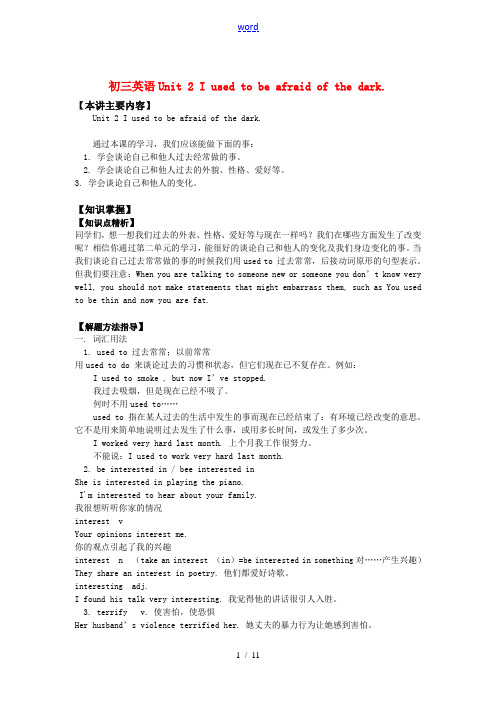
初三英语Unit 2 I used to be afraid of the dark.【本讲主要内容】Unit 2 I used to be afraid of the dark.通过本课的学习,我们应该能做下面的事:1. 学会谈论自己和他人过去经常做的事。
2. 学会谈论自己和他人过去的外貌、性格、爱好等。
3. 学会谈论自己和他人的变化。
【知识掌握】【知识点精析】同学们,想一想我们过去的外表、性格、爱好等与现在一样吗?我们在哪些方面发生了改变呢?相信你通过第二单元的学习,能很好的谈论自己和他人的变化及我们身边变化的事。
当我们谈论自己过去常常做的事的时候我们用used to 过去常常,后接动词原形的句型表示。
但我们要注意:When you are talking to someone new or someone you don’t know very well, you should not make statements that might embarrass them, such as You used to be thin and now you are fat.【解题方法指导】一. 词汇用法1. used to 过去常常;以前常常用used to do 来谈论过去的习惯和状态,但它们现在已不复存在。
例如:I used to smoke , but now I’ve stopped.我过去吸烟,但是现在已经不吸了。
何时不用used to……used to 指在某人过去的生活中发生的事而现在已经结束了:有环境已经改变的意思。
它不是用来简单地说明过去发生了什么事,或用多长时间,或发生了多少次。
I worked very hard last month. 上个月我工作很努力。
不能说:I used to work very hard last month.2. be interested in / bee interested inShe is interested in playing the piano.I'm interested to hear about your family.我很想听听你家的情况interest vYour opinions interest me.你的观点引起了我的兴趣interest n (take an interest (in)=be interested in something对……产生兴趣)They share an interest in poetry. 他们都爱好诗歌。
九年级英语全册Unit2《IusedtobeafraidofthedarkThe3rdPeriod》

Unit 2 I used to be afraid of the dark.The Third PeriodDate:Ⅰ. Teaching Aims and Demands1. Knowledge Objects(1)Talk about what you used to be afraidof and what you are still afraid of.(2) Key Vocabularyterrify, be terrified of, on2. Ability ObjectTrain students’ integrating skills.3. Moral ObjectAre you afraid of speaking in front of a group? Don’t be so shy. Be confident of yourself. Practice more, and you will sure change.Ⅱ. Teaching Key PointsTarget LanguageDid you use to be afraid of the dark?Yes, I did.Are you still afraid of the dark?No, I’m not. How about you?Me? Oh, yes! I’m terrified of the dark.So, what do you do about it?I go to sleep with my bedroom light on.Ⅲ. Teaching Difficult PointTalk about what you used to be afraid of and what you are still afraid of using the target language.Ⅳ. Teaching Methods1. Teaching by demonstration.2. Pairwork3. GroupworkⅤ. Teaching AidA projectorⅥ. Teaching ProceduresStepⅠRevisionCheck homework. Ask different students to read their reports about his favorite film star or a scientist. Then collect their writings and write comments on each paper before returning them, Display some better ones in the classroom.Show a student’s work on the screen by a projector. Help him/her correct any errors.Stephen Hawking was bornin Oxford, England in 1942.As a student, he didn’tuse to work hard. He usedto bea lazy student and do verylittle work. At the age of20,he got an incurable illness.At first, he used to be very depressed. B ut he didn’tlose heart. He went on to do some of the mostimportant scientific research after coming out ofhospital. Now he works at Cambridge University as aprofessor.Step Ⅱ 3aThis activity provides reading and writing practice using the target language.Point to the pictures and ask students to tell what is happening.S1:In Picture 1, the person is afraid of the dark.S2:In Picture 2, the person is afraid of flying in an airplane.S3:In Picture 3, the person is afraid of high places.Draw students’ attention to the chart.Read each of the four headlines and the list of items in the first column to the class.Demonstrate how to fill in the chart with a good student orally.T: Did you use to be afraid of the dark?S: Yes. I was afraid to walk home when it was dark.T: Are you still afraid of the dark?S: No, I’m not.Tell students where to put a check in the chart.Ask students to complete the "I" column of the chart on their own by checking the items that they used to be afraid of and that they are still afraid of.Check the answers.Note: Answers will vary, Ask different students to report his/her answers like this:S:I used to be afraid of the dark and high places. But now I’m afraid of neither. Step Ⅲ 3bThis activity provides oral practice using the target language. Focus attention on the conversation. Ask a pair of students to read it to the class.Write the conversation on the blackboard.Point out the list of items in the first column of Activity 3a. Say, Ask your partner about these items and complete the "My partner" columns of the chart in pairs.Ask students to work with partners.Walk around the room correcting any errors in pronunciation.Ask several pairs to share their conversations with the class.When all the students have finished the chart, Say, Now let’s check to see how many students used to be afraid or are still afraid of the same things. Invite a student to ask questions.S: Who used to be afraid of the dark?Raise your hands.(Count the hands and let students keep a record.)S: Who is still afraid of the dark? Raise your hands.(Count the hands and let students keep a record. )Do the same approach with the other items.Step Ⅳ Part 4This activity gives students an opportunity to use the target language to talk about themselves.Read the instructions to the class. Ask a good student to give an example from his or her own experience. For example, for the word eat, a student might say, I used to eat chocolate. Now I like to eat fruits of different kinds. I think chocolate is rich in calory and fat while fruits are rich in vitamin, which is good for health.Help students to write chocolate and fruits in the chart.Ask students to complete the work in groups of four. Walk around the classroom listening in on different groups and offering help with pronunciation and writing.Ask a few students to tell the class about the other students they have talked to.For example, a student may say, my desk- mate Wei Mei used to eat a lot of chocolate. Now she likes to eat fruits. She thinks keeping fit is of great importance.Note: answers to the chart will vary.Step Ⅴ SummarySay, In this class, we’ve talked about what you used to be afraid of and what you are still afraid of using the target language of this unit.Step Ⅵ Homework(1) Ask students to find out what their grandparents, parents, aunts, uncles and old friends used to be afraid of when they were children. What did these people used to be afraid of that today’s children are not afraid of?(2)Finish off the exercises on pages 6~7 of the workbook.Step Ⅶ Blackboard Design。
初三英语Unit 2 I used to be afraid of the dark.
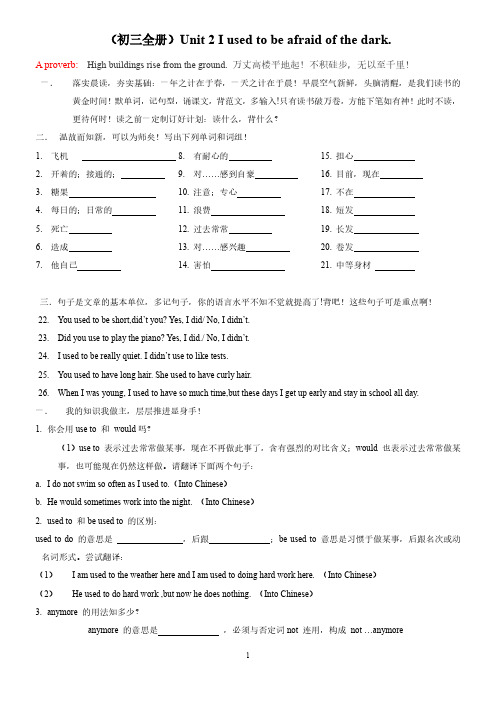
(初三全册)Unit 2 I used to be afraid of the dark.A proverb:High buildings rise from the ground. 万丈高楼平地起!不积硅步,无以至千里!一.落实晨读,夯实基础:一年之计在于春,一天之计在于晨!早晨空气新鲜,头脑清醒,是我们读书的黄金时间!默单词,记句型,诵课文,背范文,多输入!只有读书破万卷,方能下笔如有神!此时不读,更待何时!读之前一定制订好计划:读什么,背什么?二.温故而知新,可以为师矣!写出下列单词和词组!1.飞机2.开着的;接通的;3.糖果4.每日的;日常的5.死亡6.造成7.他自己8.有耐心的9.对……感到自豪10.注意;专心11.浪费12.过去常常13.对……感兴趣14.害怕15.担心16.目前,现在17.不在18.短发19.长发20.卷发21.中等身材三.句子是文章的基本单位,多记句子,你的语言水平不知不觉就提高了!背吧!这些句子可是重点啊!22.You used to be short,did’t you? Yes, I did/ No, I didn’t.23.Did you use to play the piano? Yes, I did./ No, I didn’t.24.I used to be really quiet. I didn’t use to like tests.25.You used to have long hair. She used to have curly hair.26.When I was young, I used to have so much time,but these days I get up early and stay in school all day.一.我的知识我做主,层层推进显身手!1.你会用use to 和would吗?(1)use to 表示过去常常做某事,现在不再做此事了,含有强烈的对比含义;would 也表示过去常常做某事,也可能现在仍然这样做。
- 1、下载文档前请自行甄别文档内容的完整性,平台不提供额外的编辑、内容补充、找答案等附加服务。
- 2、"仅部分预览"的文档,不可在线预览部分如存在完整性等问题,可反馈申请退款(可完整预览的文档不适用该条件!)。
- 3、如文档侵犯您的权益,请联系客服反馈,我们会尽快为您处理(人工客服工作时间:9:00-18:30)。
Unit2单元测试题二、单项选择。
1. I ___________ frustrated when I wasn’t sure of the correct answer.A. may beB. used toC. used to beD. useto be2. When I was a child, I used to ___________ chocolate.A. likingB. likeC. likedD.likes3. ___________ work in Microsoft?A. Did you used toB. Did you use toC. Do you used toD. Do you use to4. Where ___________ live before you came here?A. did you used toB. did you use toC. use he toD. he used to5. No one likes him ___________.A. stillB. neverC. anymoreD. too6. I am ___________ of spiders.A. terrifyB. terrorC. terrifyingD. terrified7. He is afraid of ___________ strangers.A. seeB. seeingC. sawD. seen8. It ___________ that he has been ill for a long time.A. seemsB. looksC. looks as ifD. seems as if9. I always go to sleep ___________ the light on.A. inB. withC. toD.and10. Don’t ___________ about things so much. It will make you stressed out.A. afraidB. terrifyC. terrifiedD. worry三.用used to或anymore的正确形式填空。
My grandmother complains about how things have changed, and she says thatlife 1 __ be better.Families aren’t families the way they 2 _____ be. Everyone’sdivorced.(离婚) If a husband and wife are having problems with their marriage, they don’t stay together 3 . And mothers 4 stay home and take careof their children, but not 5 . Everyone’s working. No one has time for children 6 . And the cars! No one walks 7 ; everybody drives. We 8 walk five miles to school everyday, even in winter. And people don’t talkto each other 9 . They are too busy to talk, toobusy to eat, too busy to think…Life 10 be simple, but it isn’t 11 .四. 完形填空Football may be the most____ of the games. People in many____ around theworld like playing it. In the 19th century(世纪)____ in England firstplayed this kind of balls. The players moved the ball____ .The first international(国际的) football game was between England and Scotland in 1872.Football is played by____ with eleven men on each team. Each team hasone way to____. It must score more goals(进球)____ the other team.Each____ in games is one point(分).Football is a round ball. Players maykick(踢) it and____ it by any part of the body except the____. Only one player on the team can use his hands. This player is the goal keeper.A football game usually____ for ninety minutes.The teams play for forty-five minutes, and then take a short rest. After this halftime rest, theyplay again for____ forty-five minutes.Now football is one of____ played in the Olympics(奥林匹克运动会).Another important international football match is called the World Cup.The World Cup is had____ every four years. The____ of the World Cupmatch is the world champion(冠军) football team.( )1. A. careful B. popular C. dangerous D.difficult( )2.A. towns B. cities C. villages D.countries( )3.A. people B. English C. children D.football( )4.A. with his foot B. by his feet C. with their feet D. bytheir feet( )5.A. two teams B. three teams C. one team D. four teams( )6.A. win B. winning C. won D. winner( )7.A. as B. like C. than D. in( )8.A. football B. goal C. ball D. player( )9.A. move B. use C. carry D. lift( )10.A. feet B. heads C. hands D. bodies( )11.A.begins B. lasts C. kicks D. gets( )12.A. other B. others C. the others D.another( )13.A. the sport teams B. the sport teamC.the team sportsD. the team sport( )14.A. first B. one C. once D. the first( )15.A. win B. winning C. won D. winner五阅读理解( 一 )It was Sunday and Tom was staying at home. After breakfast he went out into the garden and played quietly by himself. There were no kids aroundand he was used to(1) playing alone quietly. He played with Bobby,the dog. He climbed up and down the tree. Sometimes a bird wouldcome down to perch(2) on top of the doghouse. Then Tom would havethe greatest fun(3)by throwing a stone or something at it.Though he never made it, he did like doing this kind of thing.Now Tom had been in the garden for half an hour. Suddenly a crack(4)was heard and the little boy began crying.“What’s the matter,Tom?"his mother looked through the kitchen(5)window. Tom ran into the kitchen.“Mum," he sobbed(6). "I broke Bobby’s plate. I didn’t know it was so fragile(7)."His mother put her arms round him and said, “Don’t feel so sad, Tom.We have other plates for Bobby. But how did you break that one?"“I threw it at a bird but missed, and it went straight to the plate."In Tom’s hand was his father’s gold pocket watch(8)!Notes: (1)be used to 习惯于(2)perch n. 停歇(3)fun n. 爱好(4)crack n. 破碎声(5)kitchen n. 厨房(6)sob v. 抽泣(7)fragileadj. 易碎的(8)gold pocket watch 金怀表1.When did the story happen?A.On a Sunday afternoon.B.On a Sunday morning.C.At noon.D.In the evening.2.When a bird perched on top of the dog house, Tom .A.would like to play with itB.was very interested in it by throwing a stone at itC.would like to give it something to eatD.would smile3.There were no kids around and he was used to playing alone quietly. Here“kids" means .A.menB.dogsC.childrenD.birds4.How long had Tom been in the garden when his mother heard him cry?A.An hour.B.A day.C.Two hours.D.Half an hour.5.“Though he never made it" means“".A.Though he couldn’t hit a bird with a stone or somethingB.Though he couldn’t catch the birdC.Though he couldn’t have fun from the birdD.Though he couldn’t eat the bird(二)An important question about eating out is who pays for the meal. If a friend of yours asks you to have lunch with him, you may saysomething like this,“I’m afraid it’ll have to be someplace cheap,as I have very little money." The other person may say,“OK, I’llmeet you at McDonald’s."This means that the two agree to go Dutch, that is, each person pays for himself. He may also say,“Oh, no. I want to take you to lunchat Smith’s," or“I want you to try the Chinese dumplings there.They’re great." This means the person wants to pay for both of you.If you feel friendly towards this person, you can go with him andyou needn’t pay for the meal. You may just say,“Thank you. Thatwould be very nice."American customs(1) about who pays for dates(2) are much the same as in other parts of the world. In the old days, American womenwanted men to pay for all the meals. But, today, a university(3)girl or a woman in business world will usually pay her way duringthe day. If a man asks her for a dance outside the working hours,it means “Come, as my guest(4).” So as you can see, it is apolite thing to make the question clear at the very beginning.Notes:(1)custom n. 风俗(2)date n.约会(3)university n. 大学(4)guest n. 客人1.The passage tells us .A.how to eat outB.where to eat outC.what to eat outD.who pays for the meal2.If you have little money, .A.you’ll have a cheap mealB.you’ll borrow some from othersC.you’ll ask your friend to pay for your mealD.you won’t want your friends to ask you to di nner3.“Go Dutch" in this passage means .A.去饭馆B.就餐C.订餐D.各自付款4.Sometimes your friend takes you to lunch. It means .A.he’s going to lend some money to youB.he’s going to pay for your meal, tooC.he’ll be angry with youD.he can’t unders tand you5.In America,some girls and women now.A.ask men to pay for their mealsB.try to pay for the men’s mealsC.try to pay for their own mealsD.never have anything outside六.书面表达根据中英文提示,写出意思连贯,符合逻辑的英语短文。
